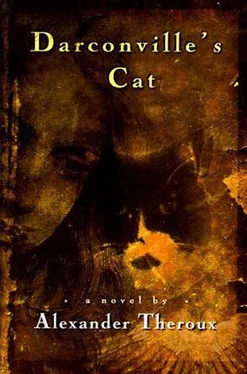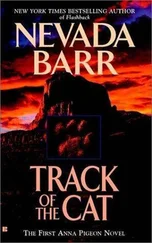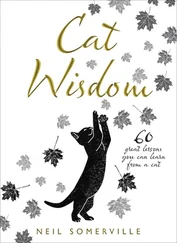Miss Trappe dodged into a dark overheated little store, bought her paper, and they continued on past the Quinsyburg post-office — the walls within painted over in flat WPA murals: frigid square-jawed men in overalls, holding trowels and staring off at horizons — and cut over by a semi-residential area toward the back of the college. The houses, large and desolate, were all clapboarded egg-brown affairs with sunken porches overcome with wisteria, an eruption of domiciliary pasteboards rising up in shingled capuches, far too close together, and although the curtains were always pulled one could almost look through them by way of imagination to see hooded furniture; engravings of stags in the hallways; perhaps an obsolete oil stove; a clawfoot bathtub upstairs (with elongated orange stains under the faucets); a single bookshelf, with copies of Law’s Serious Call , Doddridge’s Rise and Progress , Orton’s Discourse on the Aged , etc., and some poor someone sitting in a calico apron, shelling peas, or all alone in the darkness of a backroom, desperately praying for forgiveness.
The streets suddenly were then no longer paved. There were, in fact, no streets at all, only stamped-out paths of red Virginia soil winding through low scrubby bushland into an outdistrict, poor, rundown, aimless, that dropped away to an alfalfa field ballpark, where the trees were the color of dirty money and the dust sifted into your shoes like talc. Rusted old cars were humped on blocks in narrow driveways. Tarpaper hatcheries were wired smack up to the tilted wooden shacks that had either dirt or puncheon floors, no front doors, and through the dim breezeways drifted the odors of frying bread, simmering collards, and sweet potato pone. It was the black ghetto.
Most of the shacks had no indoor plumbing, and the listing outhouses in the back of each yard had simply been clapped together with dull, misshapen planks. There were pipe chimneys, makeshift windows, covered in plasti-sheet, and broken stairs, a pauperization— the direct result of racism in Quinsyburg — that kept the blacks, because poor, servile. It was a little world of fatigue, inanition, and wasted minds. Quinsyburg, only a few years previous, had closed its schools for half a decade rather than integrate, simultaneously building a private white academy, notwithstanding federal pressure, to maintain racial purity. The blacks were forced into separate schools, separate churches, and even a separate cemetery. The rents were adjusted: if a black family aspired to fix up its house, that meant it had money; if it had money, that meant not only a decrease in servility—”uppityness”—but also that it could pay more rent. An adjusted rent cured that. It was a “ceiling” theory, for people who had no ceilings. Indeed, they hadn’t much of anything. They lived out their lives as they had for centuries, cutting up logs, washing toilets, scrubbing doorways, and quietly knocking on white folks’ backdoors with a nickel to ask if the noise of their old gear-hobbing lawn-mowers would disturb the peace of the nobles inside.
The afternoon sun began to turn coppery as Darconville and Miss Trappe crossed downhill toward the ring-road. Old sambos, with napkins on their heads, sat on their warped cane-chairs and waved, while out front little black girls — their hair braided in corn-row tight plaits, their legs ashen — either played with their pedaps or skipped barefoot, hand in hand, to the Piggly Wiggly for gumballs. A few young men sloped back from the A.B.C. liquor store with bottles of fruit wine in crinkled bags and joked as they passed doorways where buxom young mothers in bandanas, looking away as they smiled, rocked their carriages with one foot and gave pieces of fatback to their children for pacifiers. There was a life here that would forever go on unchanged, immutable to pain, to policy, to the passing of pleasure, and there was perhaps in the constancy of it all, if finally in nothing else, at least something on which they could depend.
A loud chorus of “Lift Every Voice and Sing” could be heard from the small mal-shingled Negro church that suddenly came into view between several live-oaks and beyond which, as Darconville and Miss Trappe turned, the two large dormitories of Quinsy College rose across a half mile or so of woodland. The bell in the church’s squat steeple was bonging slowly, a mournful, solitary peal that seemed, echo upon echo, to get lost in the sunshine and become, ironically, the more forsaken. A group of phantom ladies in weepers, supporting each other, began to leave the church. They were crying, trying to stifle sobs with their handkerchiefs. What could have happened?
Detective, Miss Thelma Trappe stood stock-still in the middle of a hunch. She went suddenly skewbacked, unflapping her copy of the Quinsyburg Herald , and ran her eyes over the front page. She turned to page two. She turned to page three. She turned to page four, bent down, newt-eyed, and sighed. Looking over her shoulder, Darconville followed her finger — for she never said a word — to a simple photograph. It was the quizzical face of a spoon-headed black boy, about thirteen years old, and underneath were given brief reportorial facts: name, age, address, place of burial. He had been struck and instantly killed the day previous by a hit-and-run pickup truck at the corner of Main and High streets. The several witnesses from the Timberlake, dominoists by avocation, could give no description of the driver, so the sheriff closed the investigation. It was only God’s way, he no doubt felt, of turning a leaf in the Book of Eternal Decrees.
“Precisely,” said Miss Trappe.
Darconville heard the irony but kept counsel, feeling only the vibrations of her increased step in awkward silence as she stumped along homeward, pausing only to eye the sky at intervals from under her wide hat as if searching the heavens for any indication of justice or balance, a clue, of any degree, to the moderating power of the universe, some kind of proof of the stamp celestial. They were soon not far from the street where they’d first begun their walk when Darconville’s companion decided to speak,
“I lost my stepmother in the same way,” said Miss Trappe, her little mouth trembling. She tried, unsuccessfully, to shape her hands— carelessly hopping up — to an attitude of resignation. “She was coming home at dusk with several just-packed jars of autumn honey and was run down by a passing motorist, who simply drove on.” Her eyes were filling up, her hat quivering. “She was not killed right away — the report from the hospital was that she kept feverishly repeating, ‘My honey. My honey.’ Just that. ‘My honey.’ I mustn’t fail to tell you, Darconville,” sobbed Miss Trappe, “I was neither the pretty nor the favored child, but how I ran—” She gasped to breathe out pain. “—ran to her.” She smiled up through a runnel of tears. “Hearts,” she said, “was Mrs. Battle’s favorite suit.” And wiping a tear from her pitted nose, she repeated, “ ‘My honey.’ “ She swallowed. “I wanted to believe, you know, that she was asking for me.”
“She was calling you.”
Miss Trappe lifted up two little gerbil eyes and simply shook her head. Her nose was dripping. And as Darconville took her hand, soft as bird’s-eye, she heaved up the sorrow weltering in her heart. “No,” she wept, “she said she never loved me, then screamed it, Darconville, laying there like dead metal, she sere—” Darconville’s heart almost misgave. “I was s-so ashamed,” she whispered into his chest with a tiny humiliated voice, shattering with sobs, “ I completely w-wet myself, all over .”
Weeping to her feet, she suddenly turned her face up defiantly toward the sky and looked with a hideous grimace into infinity, as if to say not balanced yet, O crafty universe, not balanced yet.
Читать дальше












